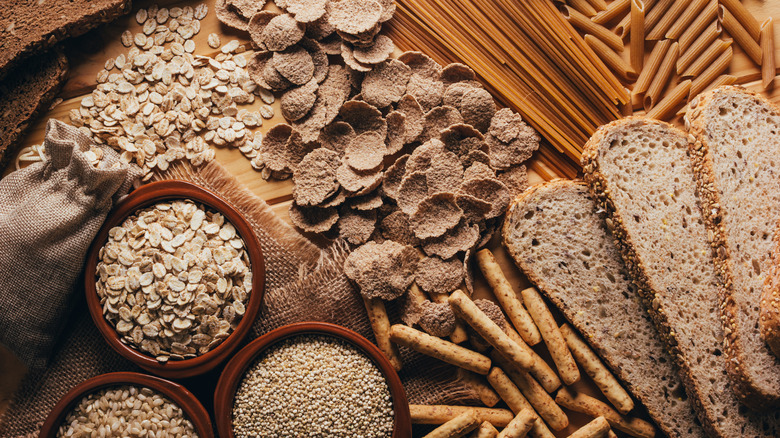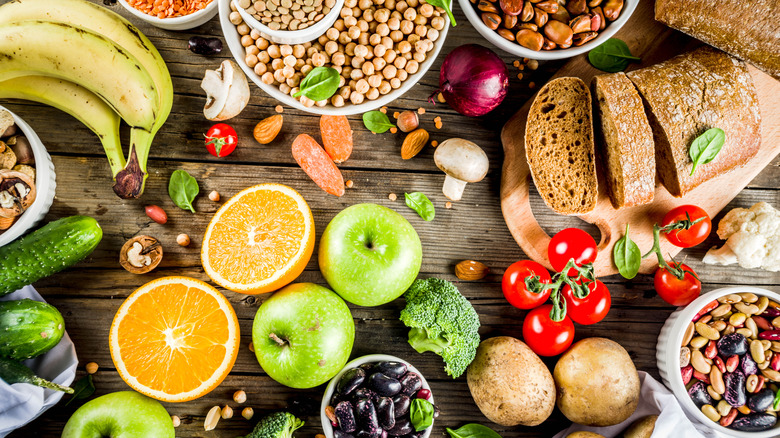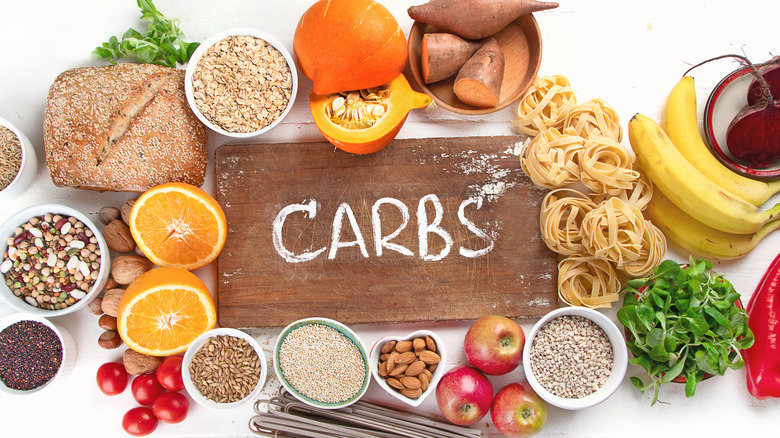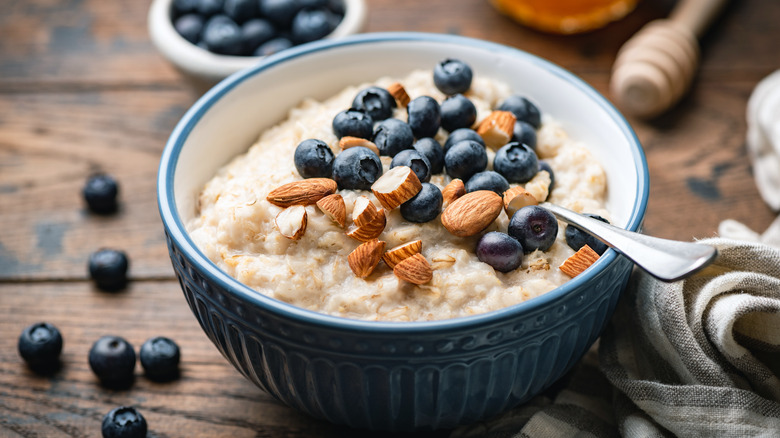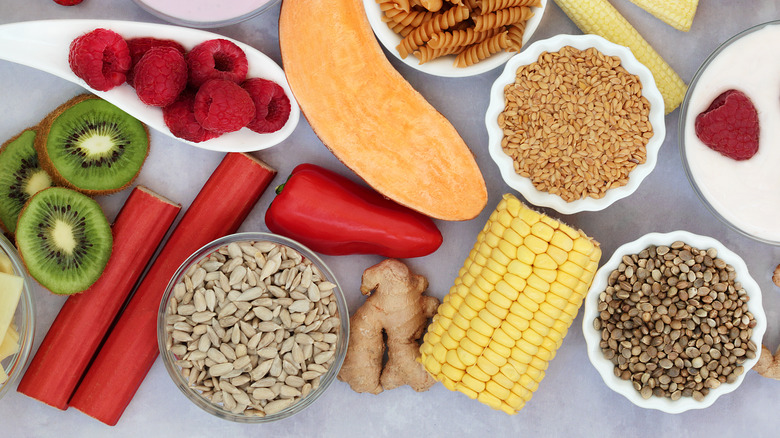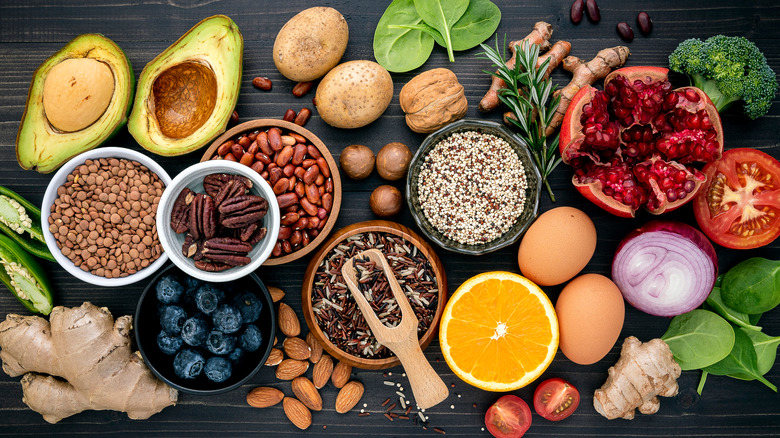Everything You Need To Know About Fiber
Fiber might be the most underrated nutrient in the entire world of nutrients. While it doesn't get nearly as much attention as, say, protein, it's incredibly important for overall wellness, playing a role in everything from gut health to heart health and doing things for our bodies that no other nutrient can do (via the Harvard T.H. Chan School of Public Health). You can also find it in some pretty delicious places, no fiber powder or foods that taste like cardboard required. Nevertheless, research conducted to develop the 2020 – 2025 Dietary Guidelines for Americans found the average American incredibly likely to be deficient.
Here's everything you need to know about fiber, from where to get it and what it can do for you to how it's digested (spoiler alert, it isn't) and whether whole foods are better than supplements. Keep reading, and by the end you'll be looking at fiber in a whole new light — and perhaps feeling inspired and empowered to add more to your plate.
It's only found in plant-based foods
Let's start with the basics. Fiber is found only in plant-based foods, so a completely carnivorous diet just isn't going to cut it. The richest sources, according to the Academy of Nutrition and Dietetics, are whole grains (like oats, brown rice, and whole wheat bread or pasta) and beans, but all plant foods, fruits and vegetables included, have some fiber in them and are nutrient-rich ways to up your intake. For instance, registered dietitian Anna Taylor recommends berries, pears, artichoke hearts, Brussels sprouts, and avocado as great fiber-rich foods to add to your diet (via Cleveland Clinic) and WebMD recommends apples, citrus fruits, broccoli, and more.
All these foods are delicious eaten on their own, but you can increase the fiber in your diet in "sneakier" ways, too, like by adding oats or avocado to smoothies (you won't even taste them!). Food52 also notes that, according to Mark Bittman in his book "How to Cook Everything," you can swap up to half of the all-purpose white flour in a recipe for whole wheat flour. While whole wheat flour has more fiber (via the Whole Grains Council), Bittman says it can also make your final product heavier and denser than using all-purpose. A mix can give you best of both worlds.
Fiber is a carbohydrate
Fiber joins sugar and starch in the category of nutrients known broadly as carbohydrates (via MedlinePlus), a term Merriam-Webster defines as "any of various neutral compounds of carbon, hydrogen, and oxygen." While our bodies need carbohydrates to survive (they're our primary source of energy), not all are created equal. The American Diabetes Association notes that sugar is classified as a "simple" carbohydrate because it's very easily and quickly digested by our bodies, while starches are known as "complex" carbohydrates because they take longer to digest and break down. Fiber is a bit of an outlier — more on that later — but many consider it a complex carbohydrate, as well, because it also slows digestion and helps keep energy release more sustained (via Cleveland Clinic).
Complex carbohydrates are typically considered the healthier of the two types, and are found in nutrient-rich foods like whole grains, beans, and vegetables, while simple carbohydrates, those simple sugar molecules, are found more often in processed foods like white flour and candy. Regardless of type, though, all carbohydrates — sugar, starch, and fiber — are included on nutrition labels under the term "total carbohydrate."
You can't digest fiber
While starchy complex carbs take longer for the body to break down, fiber is unique in that it isn't digested at all — an attribute that is at least partially responsible for some of its health benefits, like promoting gut health and regulating blood sugar (via Harvard Health).
The fact that fiber isn't digested also means you can use it to calculate something called "net carbs." If you've ever followed an eating pattern that requires counting carbs (like a diet to help manage diabetes), you might be familiar with the term. As Medical News Today explains, net carbs are what you get when you take the total amount of carbohydrates in food and subtract the amount of fiber. So, if you're looking at a food label that says the snack you're about to eat has 15 grams of total carbohydrates, but five grams of those carbohydrates are fiber, that snack contains 10 grams of net (or digestible) carbohydrates overall. This can be especially helpful for some people on a low-carb diet, as it makes more "room" for a variety of nutritious foods that might otherwise be too "high" in carbohydrates to include.
There are two kinds of fiber
There are two main categories of fiber: soluble fiber and insoluble fiber. The biggest difference, Mayo Clinic notes, is that soluble fiber dissolves in water and becomes a gel-like substance while insoluble fiber does not, instead staying intact as it makes its way through the body. They also have slightly different benefits, along with several different subtypes.
WebMD explains that soluble fibers like pectin, psyllium, inulin oligofructose, mucilage, beta-glucan, gums, and wheat dextrins can help lower cholesterol and manage blood sugar levels. They're found in fruits, vegetables, oats, beans, barley, and flaxseed. Insoluble fibers, like cellulose and lignin, are sometimes called "roughage," and are the ones best known for preventing constipation. You can find insoluble fiber in foods like whole wheat or whole grain products, nuts, seeds, brown rice, and produce skins. All that said, most sources of fiber have a combination of both kinds — so it's best to get a variety.
Fiber is important for gut health
An important benefit of fiber is that it can help improve your microbiome, an important component of gut health. That's because while you can't digest fiber, the beneficial bacteria living in your gut can use soluble fiber as fuel. Indeed, a 2021 study published in the journal mSystems found, increasing fiber intake for just two weeks was enough to shift the makeup of their adult subjects' microbiomes to a more favorable ratio (more of the "good" bacteria and less of the "bad").
This is important because, the researchers note, an individual's microbiome makeup could be linked to several aspects of overall wellness. As Dr. Katrine Whiteson, co-author of the 2021 study and a molecular biology and biochemistry professor at the University of California, Irvine, told Medical News Today, "The lack of fiber intake in the industrialized world is starving our gut microbes, with important health consequences that may be associated with increase in colorectal cancer, autoimmune diseases, and even decreased vaccine efficacy and response to cancer immunotherapy."
It can also benefit heart health
Fiber has been linked to a lower risk of heart disease, the number one killer on the World Health Organization's list of leading causes of death worldwide. The American Heart Association (AHA) encourages fiber specifically to help improve cholesterol levels, and a research review published in the Journal of Chiropractic Medicine in 2017 looked at data collected from more than 30 prior studies and found that the data backs this recommendation. Among all study participants, those who consumed the most fiber had a lower risk of developing or dying from heart disease compared to those who consumed the least, and study authors hypothesized that this could be due to its cholesterol-lowering effects.
In fact, diets known for benefiting heart health, like the Mediterranean diet, may help, in part, because they include more fiber than the standard American diet. Research found that a typical Mediterranean diet, which a study outlined in Eating Well found could lower risk of a heart attack by 26%, includes more than twice the daily fiber consumed in many industrialized countries (per The Journals of Gerontology, Series A: Biological Sciences and Medical Sciences).
Fiber can help regulate your blood sugar
Eating enough fiber can help control blood sugar because, as Mayo Clinic notes, it slows down the digestion and absorption of carbohydrates after a meal. WebMD explains that when you eat carbohydrates in any form, they're broken down into individual sugar molecules that are then absorbed into your bloodstream. When your body senses this, it produces insulin — a hormone that "unlocks" blood cells so the sugar that's circulating can enter them and be used to produce energy.
Eating carbohydrate-rich foods without any fat, protein, or fiber to slow down digestion can lead to dramatic spikes in blood sugar as opposed to a more sustained release over time. Avoiding spikes in blood sugar (and the subsequent spikes in insulin) is not only important for individuals with diabetes, but also to help prevent those without diabetes from developing it. That's because, as the Harvard T.H. Chan School of Public Health explains, too many drastic spikes over time can cause our cells to become desensitized to insulin — "insulin resistant" — and increase the risk of type 2 diabetes.
While the American Diabetes Association notes there are a wide variety of factors that can influence your blood sugar levels at any given time, from dehydration to exercise or hormone levels, making sure to include fiber in your diet can be a good place to start.
It can help you maintain a healthy weight
Experts from the Mayo Clinic to the Academy of Nutrition and Dietetics also recommend fiber for maintaining a healthy weight. Fiber's contribution in this area could be due to its ability to help us feel full and satisfied, and the fact that high-fiber foods tend to have fewer calories than low-fiber foods. A study published in 2015 in the Annals of Internal Medicine compared weight loss in individuals that adopted the American Heart Association's diet for lowering the risk of heart disease (which includes many fiber-rich foods as part of its fulsome guidelines) to weight loss in individuals who received no instruction other than just to increase fiber. Researchers found that there wasn't a huge difference in the results: Even the group who focused on nothing but getting at least 30 grams of fiber a day (they weren't asked to change anything else about their diet or to add exercise, improve sleep, etc.) lost an average of 4.6 pounds over the course of the 12-month study and were able to keep it off for the entire duration, compared to the diet group who lost an average of nearly 6 pounds. According to the researchers, while more study on the topic is needed, this might indicate the merit of a simpler approach to weight loss that focuses only on fiber intake rather than on every element of diet.
Fiber could reduce inflammation
According to the Arthritis Foundation, fiber might have the potential to reduce inflammation. Some research links high-fiber diets to lower levels of C-reactive protein — a compound in the blood that indicates inflammation and has been associated with rheumatoid arthritis, heart disease, and diabetes. Additionally, when our good gut bacteria digests fiber, they release byproducts that are thought to lower inflammation throughout the body, as well. One study published in March 2022 in the journal Nutrition, Obesity, and Exercise found that elevated total fiber intake was associated with lower levels of systemic (another way of saying "body-wide") inflammation, with cereal fibers specifically showing a beneficial association.
While the research is promising, it's unclear whether these benefits come from fiber itself or from the other beneficial compounds that are often found in fiber-rich foods like whole grains, fruits, and vegetables — so it's best to focus on a nutritious diet in totality, as opposed to placing too much emphasis on one specific nutrient.
Overall, fiber could help you live a long, healthy life
With so many potential benefits, it shouldn't come as a surprise that studies have found fiber intake to be associated with a longer, healthier life. One study published in 2011 in the Archives of Internal Medicine, for example, found that fiber lowered the risk of death from heart disease, respiratory disease, and infectious disease by 24-56% in men and 34-59% in women over a follow-up period that averaged 9 years. Fiber from grains, in particular, showed a beneficial effect.
Another study published in 2016 in The Journals of Gerontology found that individuals who got the most fiber had an "almost 80% greater likelihood of living a long and healthy life over a 10-year follow up," as lead researcher Bamini Gopinath of The Westmead Institute for Medical Research explained to Science Direct. Overall, study participants with a higher-fiber diet were less likely to suffer from hypertension, diabetes, dementia, depression, and functional disability. Of all variables measured (fiber, total carbohydrate intake, sugar intake, and glycemic load), fiber made the biggest difference when it came to healthy aging.
You should include fiber in your diet every day
The current Dietary Guidelines for Americans (DGA) recommend 14 grams of fiber per 1,000 calories. So, for a typical 2,000-calorie diet, your goal would be to get 28 grams of fiber a day. That said, some expert organizations recommend different amounts of fiber for men and women. The Mayo Clinic, for example, recommends women aim for 21 to 25 grams a day, and men aim for 30 to 38 grams a day.
To put those numbers into context, according to the United States Department of Agriculture, one cup of raspberries has about 8 grams of fiber, a half a cup of kidney beans has about 6, one cup of broccoli and one medium apple both have about 5, and a half a cup of cooked bulger has about 4. Eat all five of these items in a day and you'll have reached the 28 grams recommended by the Dietary Guidelines to help maintain optimal health.
You're probably not getting enough
Even though fiber is plentiful in a variety of tasty, nutritious foods, chances are you're not getting enough. But it's nothing personal — more than nine in 10 people are currently falling short according to research in the DGA. This is because, in general, we're just not eating enough fruits, vegetables, and whole grains to get us the fiber we need.
Given that plant-based foods are the only sources of fiber (remember animal products don't have any), it's no wonder vegans get around three times more fiber than the average American. Indeed, according to a study in The American Journal of Clinical Nutrition, participants following a vegan diet got an average of 46 grams of fiber a day — well above the currently recommended minimum. On the flip side, Harvard Health Publishing notes that the average American gets just 10 to 15 grams of fiber a day.
Fiber-rich foods are recommended over supplements
If you're looking for ways to up the fiber in your diet, it's easy to do so by adding more nutrient-rich fruits, vegetables, and whole grains onto your plate every day. While fiber supplements do exist, experts from the Academy of Nutrition and Dietetics recommend getting your fiber from whole foods, instead. This is because fiber supplements haven't always been found to have the same benefits as fiber consumed in whole foods, like helping us feel full and satisfied. And, too, the jury is still out as to whether or not it's the fiber specifically or the other nutrients typically found in fiber-rich foods (like vitamins, minerals, and antioxidants) that are most responsible for the beneficial effects on the body.
In general, getting a variety of nutrient-rich whole foods in your diet can help ensure you're not only getting the fiber (of both types) that you need, but also that you're more likely to meet your nutrient needs overall and be as healthy as possible.

